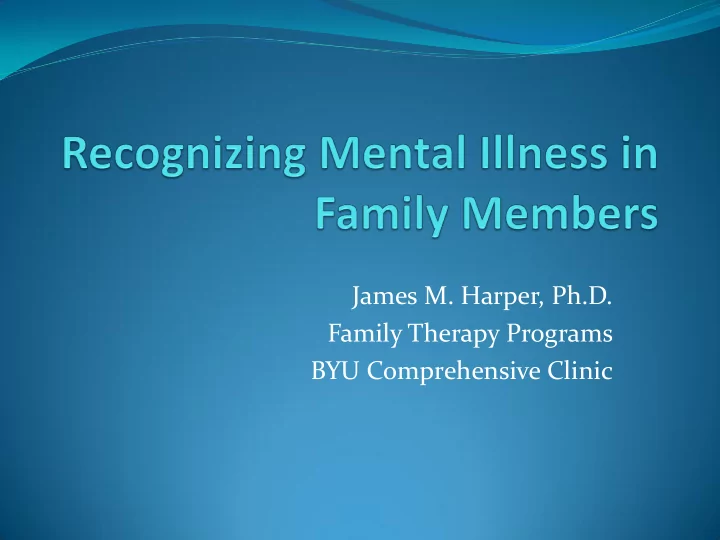

James M. Harper, Ph.D. Family Therapy Programs BYU Comprehensive Clinic
National Institute of Mental Health estimates 26% of adults experience a mental illness in a given year-57.7 million
Adults Suffering Selected Mental Illness during any given year
Warning Signs: Perception/Thinking • Persistent irrational fears (paranoia) or impulses • Constant and irrational worrying • Delusions or hearing voices when no one else is around • Extreme guilt • Racing thoughts that can’t be stopped • Difficulty concentrating • Inability to track thoughts/form concepts • Pre-occupied with suicide • Unusual beliefs about personal powers; magical thinking
Warning Signs: Feelings • Mood swings that are unrelated to environment or inappropriate • Increased irritability-anger for no reason • Lack of emotion/inappropriate emotion • Prolonged sadness or “blahs” • Extreme anxiety that seems out of control • Vague feeling of being disconnected from self or surroundings
Warning Signs Related to Behavior • Non-responsiveness to environment; No initiative; No interest in activities that have previously brought pleasure • Isolation and loss of interest in others • Decreased ability to cope with stressors • Use of drugs, alcohol, or smoking to cope • Drop in functioning: school, work, relationships • More conflictual, easily offended, reactive to others • Self abusing behavior (head banging, self inflicted wounds) • Pressured speech & problems with speech that are hard to explain • Dramatic changes in sleep, eating, or personal hygiene • Heightened sensitivity to sights, sounds, smells, or touch • Uncharacteristic, peculiar behavior-increase in risky behavior
Life Events that Increase Risk Trauma (physical/sexual abuse, domestic violence) Stressors “pile up” Multiple losses (Count ambiguous losses too) Divorce or separation Physical illness including viral infections Accidents with related head trauma Parentification as children Mental Illness in the intergenerational family
How Are Families Affected by Mental Illness? Similar to how families respond to chronic physical illnesses Both family and the individual are affected If family is functioning poorly before mental illness is diagnosed, negative effects of the illness on the family will be greater
First Stage: Crises, Chaos, Fear, Shock SOURCE: Fox, D. Emotional Impact of Mental illness on Families . www.mentalhealthlibrary.info May occur when family member Becomes delusional, paranoid Hears voices when no one is present Is unable to work or perform in school Attempts suicide Enters a manic phase Has a panic attack Exhibits pattern of interpersonal behavior that is atypical for them Likely to blame the ill person Likely to blame themselves Likely to be ashamed Confusion among other siblings May try to organize family routine and structure around illness
Needs of Family Members During First Stage Someone to listen without judging Empathy for the pain and devastation Support Encouragement to maintain other family relationships Reassurance that they did not cause illness Help in Finding Resources NAMI (National Alliance for the Mentally Ill)
Second Stage: Accept that Illness is Real, Learning to cope Anger and Resentment (sometimes directed toward God, faith congregation, professionals, or ill person) “Ripple effect” --Increased conflict among family members Sense of guilt Grief
Needs of Family Members During Second Stage Education about mental illness Someone to listen without judging-vent feelings Help in letting go of unrealistic expectations Need a plan for care and treatment of family member with mental illness Need reminder about self care NAMI’s Family -to-Family Program Respite Care
Third Stage: Understanding and Acceptance, Sometimes Advocacy Recognize that bad things happen to good people Recognize that life is still worth living and we will go on Good self care among all family members Respite Care
Needs of Family Members During Third Stage Restoring balance in daily activities and life Help in letting go of unrealistic expectations NAMI National www.nami.org Utah County (801) 373-2688 or 442-0591 State of Utah 1600 West 2200 South, Suite 202 West Valley City, UT 84121 (801)323-9900 email: education@namiut.org Website: www.namiut.org
It helps to have others who care
Marshall Forces to Care and Protect
Keep Hope Alive!
Recommend
More recommend